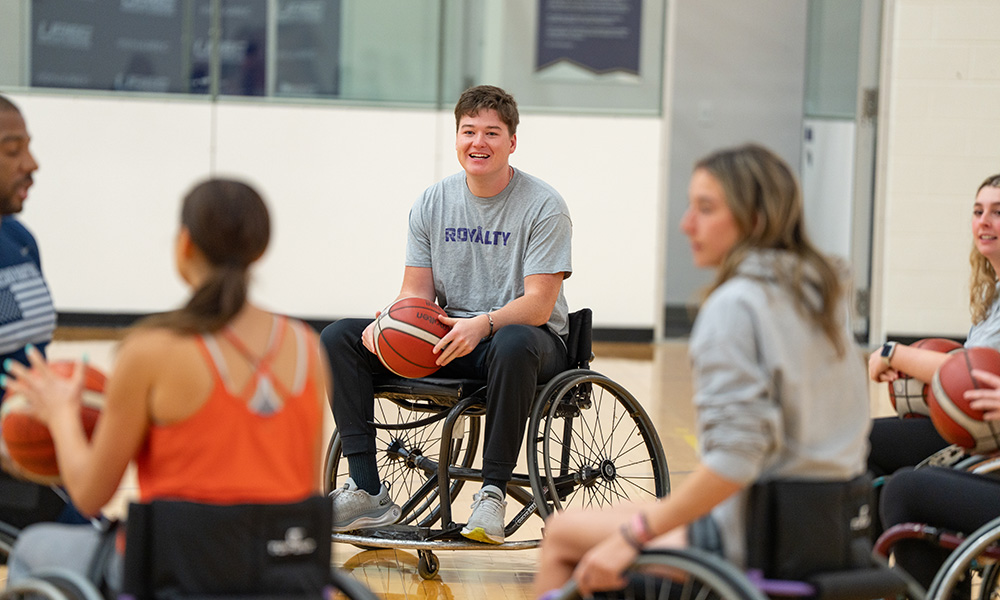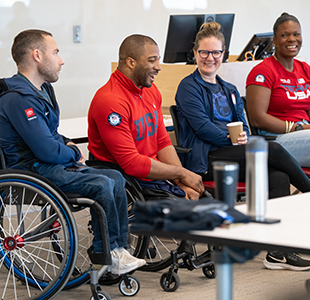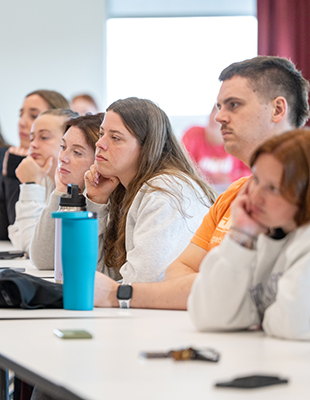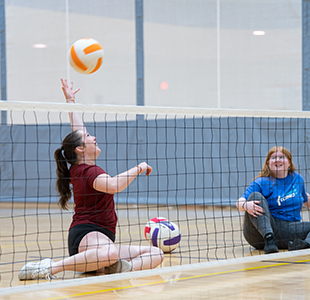Paralympic Skill Lab fosters disability awareness, interprofessional skills
College of Health and Behavioral Studies
This April, the ninth annual Paralympic Skill Lab (PSL) hosted four Paralympians who led JMU students through discussions and hands-on Para sport activities, including wheelchair basketball, sitting volleyball and goalball, aiming to foster a deeper understanding of both lifetime fitness at various ability levels and the experiences of disabled individuals.

The wheelchair basketball session was led by Team USA Wheelchair Basketball gold medalists Trevon Jenifer and Ryan Neiswender. Nicky Nieves, Team USA Women’s Sitting Volleyball Team gold medalist, led students through the sitting volleyball station. Mindy Cook, Team USA Goalball silver medalist, introduced and led students through a game of Goalball, which is played while using eyeshades to make the sport accessible to visually impaired players.
“Every year, we reach a large cross section of KIN 100 students through PSL,” said Cathy McKay, Kinesiology professor and organizer of the event. This year, in addition to KIN 100 students, who represent various majors across the university, McKay coordinated the event so that undergraduate Coaching minors and students studying Physical and Health Education, as well as graduate students in Occupational Therapy (OT) and Athletic Training (AT) participated in PSL.
The additional workshop sessions and a second-day event for OT and AT students allowed the students to meet with and work alongside the Paralympians in small cohorts in order to develop a deeper understanding of the experiences of disabled individuals, as they may work with them in their future career paths.
“I had so much fun those two days getting to play their sports and being able to talk with them after,” said Ryan Thacker, AT student. “It’s a day I will not forget after I graduate from this program.”

McKay partnered with OT and AT for this year’s PSL with the help from a CHBS collaborative grant she applied for alongside Kirk Armstrong, Athletic Training professor and AUH for Health Professions, and Julie Bonham, Program Director for OT.
“I knew Cathy had successfully hosted [the PSL] in the past and was excited that she had an interest in including our graduate students,” said Armstrong. “This activity provided a means for our students to learn how they will work together collaboratively in professional practice to positively impact patient outcomes with this unique patient population.”
“When looking through the lens of occupational therapy, our aim is to be able to optimize our clients’ ability to be able to do what they want to do and what they need to do,” said Bonham. “Sport is an occupation and a source of passion for many. It was important for students to be able to see sport as a therapeutic modality in occupational therapy.”
“This experience really opened my eyes to how much the Paralympic sport movement has to offer,” said Audrey Bowden, AT student. “I think learning from each of the athletes and their stories was influential because it really opened a door to a whole new sport world.”

For undergraduate participants, KIN 100 is a general education course that aims to help students know and understand lifetime fitness and wellness activities. The PSL introduces them to adapted sports they may not have much prior knowledge or experience with and allows them to participate in them.
In addition, “a second goal [for PSL] is for students to make contact with Paralympians so that they can reflect on and understand their own perceptions of ability and disability,” said McKay.
“When we have meaningful contact with people different from ourselves, we start to change our preconceived notions and biases,” said McKay. “Individuals with disabilities are in a group that is often times marginalized, or perceived to be different than the able-bodied norm.”
“Both the faculty and students were all in” at PSL this year, said Armstrong. “They challenged themselves while participating in the sports activities but also how to be better athletic trainers and healthcare providers.”
